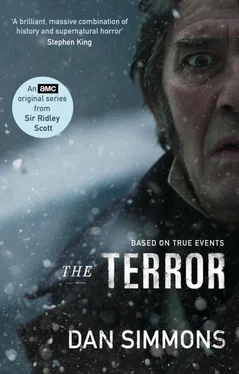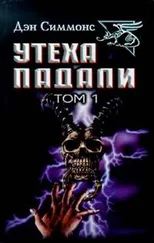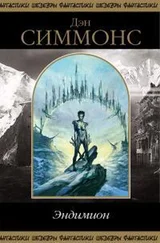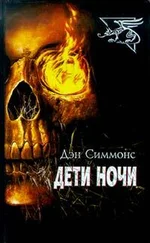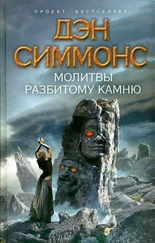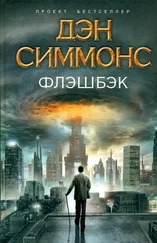The leather straps are now rigged for both of them to pull — neither will ride unless there is an injury or illness — but Crozier knows that Silence has built this sledge with great care in the hopes that it may be pulled by a dog team before this year is over.
She is with child. She has not told Crozier this — by the strings or by a glance or by any other visible means — but he knows it and she knows he does. If all goes well, he estimates that the baby will be born in the month he used to think of as July.
The sledge carries all of their robes and skins and cooking gear and tools and skin-sealed Goldner tins to hold water once thawed and a supply of frozen fish, seal, walrus, fox, hare, and ptarmigan. But Crozier knows that some of this food is for a time that may not come — at least for him. And some of it may be for presents, depending upon what he decides and what then happens out on the ice. He knows that, depending upon what he decides, they will both be fasting soon in preparation — although, as he understands it, he is the only one who must fast. Silence will join him in the fast simply because she is his wife now and will not eat when he doesn’t. But if he dies, she will take the food and the sledge and come back to land to live her life and continue her duties here.
For days they travel north along a coastline, skirting cliffs and too-steep hills. A few times the severe topography forces them out onto the ice, but they do not want to be out there for long. Not yet.
The ice is breaking up here and there, but only into small leads. They do not stop to fish at these leads or to pause at polynyas , but press on, pulling ten hours a day or more, moving back to land as soon as they can to continue the hauling there even though it means much more frequent refreshening of the ice on the runners.
On the evening of the eighth night, they pause on a hill and look down at a cluster of lighted snow-domes.
Silence has been careful to approach this little village from the downwind side, but still one of the dogs staked into the ice or earth below begins to bark madly. But the others do not join him.
Crozier stares at the lighted structures — one is a multiple dome made up of at least one large and four small snow-houses connected by common passageways. Just the thought, much less the sight, of such community makes Crozier ache inside.
From far below, muffled by snow blocks and caribou skin, comes the sound of human laughter.
He could go down there now, he knows, and ask this group to help him find his way to Rescue Camp and then to find his men; Crozier knows this is the village of the band belonging to the shaman who escaped the massacre of eight Esquimaux on the other side of King William Island and it is also Silence’s extended family, as were the eight murdered men and women.
He could go down and ask them to help, and he knows that Silence will follow and translate with string-signs. She is his wife. He also knows the odds are great that unless he does what he will be asked to do out on the ice — Silence’s husband or no and whatever their reverence and awe and love for her — these Esquimaux may well greet him with smiles and nods and laughter and then, when he is eating or asleep or unwary, will slip tight thongs over his wrists and a skin bag over his head and then stab him again and again, women stabbing along with the hunters, until he is dead. He has dreamt about his blood flowing red on white snow.
Or perhaps not. Perhaps Silence does not know what will happen. If she has dreamt that particular future, she has not stringed the outcome to him nor shared those dreams.
He doesn’t want to find out now anyway. This village, this night, tomorrow — before he has decided about the other thing — is not his immediate future, whatever else his future and his fate may or may not be.
He nods to her in the darkness and they turn away from the village and drag the sledge north along the coast.
During the days and nights of travel — they rig only a protective caribou skin to hang above them from the sledge-antlers as they huddle together under hides for the few hours they sleep — Crozier has much time to think.
In the last few months, perhaps because he has had no one to speak to — or at least no interlocutor who can respond with actual out-loud speech — he has learned how to let different parts of his mind and heart speak within him as if they were different souls with their own arguments. One soul, his older, more-tired soul, knows that he has been a failure in every way a man can be tested. His men — the men who trusted him to lead them to safety — are all dead or scattered. His mind hopes that some have survived, but in his heart, in his soul of his heart, he knows that any men so scattered in the land of the Tuunbaq are already dead, their bones bleaching some unnamed beach or empty ice floe. He has failed them all.
He can, at the very least, follow them.
Crozier does not yet know where he is, although he suspects more each day that they have wintered on the western coast of a large island northeast of King William Island, at a point on almost the same latitude as Terror Camp and Terror herself, although those sites would be a hundred miles or more west from here across the frozen sea. If he wanted to return to Terror he would have to travel west across this sea and perhaps across more islands and then across all of the north of King William Island itself and then twenty-five more miles out onto the ice to reach the ship he abandoned more than ten months earlier.
He does not want to return to Terror .
Crozier has learned enough about survival in the past months that he thinks he can find his way back to Rescue Camp and even to Back’s River given enough time, hunting as he goes, building snow-houses or skin tents when the inevitable storms arise. He can seek out his scattered men this summer, ten months after he abandoned them, and find some trace of them, even it if takes years.
Silence will follow him if he chooses this path — he knows she will — even though it means the death of everything she is and everything she lives for here.
But he wouldn’t ask her to. If he were to go south after his crew, he would go alone because he suspects that, despite all his new knowledge and skills, he would die on such a search. If he doesn’t die on the ice, there will be an injury on the river he would have to follow south. If the river or injury or illness along the way don’t kill him, he might encounter hostile Esquimaux groups or the even more savage Indians farther south. Englishmen — especially the old arctic hands — love to believe that Esquimaux are primitive but peaceful people, slow to anger, always resistant to war and strife. But Crozier has seen the truth in his dreams: they are human beings, as unpredictable as any other race of man, and often descend into warfare and murder and, in hard times, even cannibalism.
A much shorter and surer route to rescue than going south, he knows, would be to head due east from here across the ice before the ice pack opens for the summer — if it opens at all — hunting and trapping as he goes, then crossing the Boothia Peninsula to its eastern coast, traveling north to Fury Beach or the old expedition sites there. Once at Fury Beach he could just wait for a whaler or rescue ship. The chances for his survival and rescue in that direction are excellent.
But what if he makes it to civilization… back to England? Alone. He will always be the captain who let all his men die. The courtmartial will be inevitable, its outcome predetermined. Whatever the court’s punishment might be, the shame will be a lifelong sentence.
But this is not what dissuades him from heading east or south.
Читать дальше
